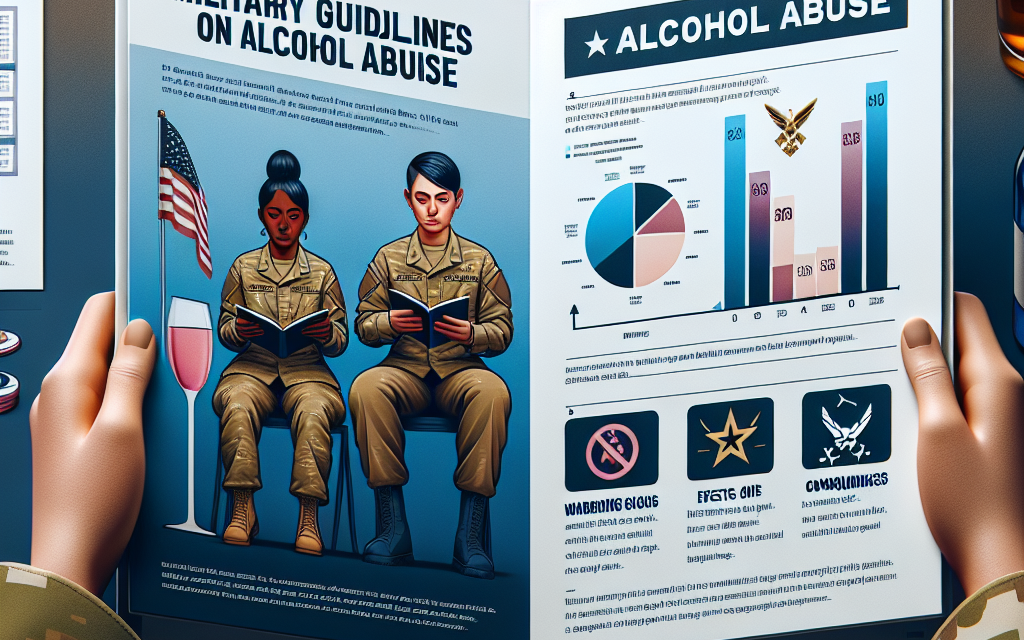Understanding Military Guidelines on Alcohol Abuse
Alcohol abuse within military ranks is a significant concern that affects not only the individuals involved but also the overall effectiveness and readiness of military units. The military has established comprehensive guidelines to address alcohol abuse, promote responsible drinking, and provide support for those struggling with alcohol-related issues. This article delves into the military’s approach to alcohol abuse, examining the guidelines, the impact of alcohol on service members, prevention strategies, treatment options, and the role of leadership in fostering a healthy environment.
The Scope of Alcohol Abuse in the Military
Alcohol abuse in the military is a multifaceted issue that has garnered attention from various stakeholders, including military leadership, healthcare providers, and policymakers. Understanding the scope of this problem is crucial for developing effective interventions and support systems.
Statistics indicate that alcohol misuse is prevalent among military personnel. According to a study published in the Journal of the American Medical Association, approximately 27% of active-duty service members reported binge drinking in the past month. This statistic is alarming, considering the potential consequences of alcohol abuse, including impaired judgment, increased risk of accidents, and negative impacts on mental health.
Several factors contribute to alcohol abuse in the military, including:
- High-stress environments: Military personnel often face high-stress situations, which can lead to coping mechanisms that include alcohol consumption.
- Cultural acceptance: Alcohol consumption is often normalized within military culture, making it challenging for individuals to recognize when their drinking becomes problematic.
- Deployment experiences: Service members may turn to alcohol as a way to cope with the psychological toll of deployment and combat experiences.
Understanding these factors is essential for developing targeted prevention and intervention strategies. The military’s guidelines on alcohol abuse aim to address these issues by promoting responsible drinking and providing resources for those in need.
Military Guidelines on Alcohol Consumption
The military has established specific guidelines regarding alcohol consumption to mitigate the risks associated with alcohol abuse. These guidelines vary slightly among different branches of the military but share common principles aimed at promoting responsible drinking and ensuring the safety and readiness of service members.
Key components of military guidelines on alcohol consumption include:
- Legal drinking age: The legal drinking age for military personnel is 21, in accordance with federal law. This guideline is strictly enforced, and violations can result in disciplinary action.
- Responsible drinking: Service members are encouraged to drink responsibly, which includes understanding personal limits and avoiding excessive consumption.
- Zero tolerance for drunk driving: The military maintains a zero-tolerance policy for driving under the influence of alcohol. Service members caught driving while intoxicated face severe consequences, including court-martial and loss of driving privileges.
- Alcohol education programs: The military provides education on the effects of alcohol, responsible drinking practices, and the risks associated with alcohol abuse. These programs are designed to raise awareness and promote healthier choices.
In addition to these guidelines, the military emphasizes the importance of leadership in setting the tone for alcohol consumption within units. Leaders are encouraged to model responsible drinking behaviors and create an environment where service members feel comfortable seeking help for alcohol-related issues.
The Impact of Alcohol Abuse on Service Members
Alcohol abuse can have profound effects on service members, impacting their physical health, mental well-being, and overall performance. Understanding these impacts is crucial for addressing the issue effectively.
Physical health consequences of alcohol abuse include:
- Increased risk of injuries: Alcohol impairs coordination and judgment, leading to a higher likelihood of accidents and injuries, both on and off duty.
- Chronic health conditions: Long-term alcohol abuse can lead to various health issues, including liver disease, cardiovascular problems, and neurological disorders.
- Substance dependence: Regular heavy drinking can lead to alcohol dependence, requiring medical intervention for recovery.
Mental health is also significantly affected by alcohol abuse. Many service members use alcohol as a coping mechanism for stress, anxiety, and depression. However, this can exacerbate existing mental health issues and lead to a cycle of dependence. Research indicates that service members with alcohol use disorders are more likely to experience symptoms of post-traumatic stress disorder (PTSD) and depression.
Performance-related consequences include:
- Decreased operational readiness: Alcohol abuse can impair a service member’s ability to perform their duties effectively, jeopardizing mission success.
- Disciplinary actions: Violations of alcohol-related policies can result in disciplinary actions, including loss of rank, pay, or even discharge from service.
- Impact on unit cohesion: Alcohol abuse can create tension within units, affecting morale and teamwork.
Addressing the impact of alcohol abuse on service members requires a comprehensive approach that includes prevention, education, and access to treatment resources. The military’s guidelines aim to mitigate these effects and promote a culture of health and wellness.
Prevention Strategies and Programs
Preventing alcohol abuse in the military is a critical component of maintaining the health and readiness of service members. The military has implemented various strategies and programs designed to educate personnel about the risks of alcohol abuse and promote responsible drinking behaviors.
Key prevention strategies include:
- Education and training: The military provides ongoing education and training on the effects of alcohol, responsible drinking practices, and the importance of seeking help when needed. Programs such as the Army’s “Risk Reduction Program” focus on educating soldiers about the dangers of alcohol misuse.
- Peer support programs: Many military units have established peer support programs that encourage service members to look out for one another and provide support for those struggling with alcohol-related issues.
- Access to resources: The military ensures that service members have access to resources such as counseling services, support groups, and treatment programs for alcohol abuse.
- Promotion of healthy activities: Encouraging participation in healthy activities, such as sports, fitness programs, and recreational events, can provide alternatives to drinking and foster a sense of community.
Case studies have shown that effective prevention programs can lead to a reduction in alcohol-related incidents within military units. For example, the Navy’s “Sailor Assistance and Intercept for Life” (SAIL) program has demonstrated success in reducing alcohol-related incidents by providing early intervention and support for sailors at risk of alcohol abuse.
Moreover, the military emphasizes the importance of leadership in prevention efforts. Leaders are encouraged to create an environment that promotes healthy behaviors and supports service members in making responsible choices regarding alcohol consumption.
Treatment Options for Alcohol Abuse
For service members struggling with alcohol abuse, access to effective treatment options is essential for recovery. The military offers a range of treatment programs designed to address the unique needs of service members and their families.
Key treatment options include:
- Outpatient treatment programs: These programs provide counseling and support for individuals struggling with alcohol abuse while allowing them to maintain their daily responsibilities. Outpatient programs often include individual therapy, group therapy, and educational sessions.
- Inpatient rehabilitation: For those with severe alcohol dependence, inpatient rehabilitation programs offer a structured environment for recovery. These programs typically include medical supervision, therapy, and support services.
- Alcoholics Anonymous (AA): Many military installations have AA meetings available for service members seeking support from peers who have experienced similar challenges with alcohol abuse.
- Family support programs: Recognizing that alcohol abuse affects not only the individual but also their families, the military offers support programs for family members to help them cope with the challenges associated with a loved one’s alcohol abuse.
Research has shown that early intervention and access to treatment can significantly improve outcomes for service members struggling with alcohol abuse. A study published in the Journal of Substance Abuse Treatment found that service members who participated in treatment programs were more likely to achieve long-term sobriety compared to those who did not seek help.
Additionally, the military’s commitment to reducing the stigma associated with seeking help for alcohol-related issues is crucial for encouraging service members to access treatment. By fostering a culture of support and understanding, the military can help individuals feel more comfortable seeking the assistance they need.
The Role of Leadership in Addressing Alcohol Abuse
Leadership plays a pivotal role in addressing alcohol abuse within the military. Effective leaders set the tone for their units and influence the culture surrounding alcohol consumption. By prioritizing the health and well-being of their personnel, leaders can create an environment that promotes responsible drinking and encourages individuals to seek help when needed.
Key responsibilities of military leaders in addressing alcohol abuse include:
- Modeling responsible behavior: Leaders should demonstrate responsible drinking behaviors and make it clear that excessive alcohol consumption is not acceptable within their units.
- Encouraging open communication: Creating an environment where service members feel comfortable discussing alcohol-related issues without fear of judgment or reprisal is essential for fostering a culture of support.
- Providing resources: Leaders should ensure that service members are aware of the resources available for addressing alcohol abuse, including counseling services and treatment programs.
- Implementing policies: Enforcing policies related to alcohol consumption and ensuring that disciplinary actions are taken when violations occur can help reinforce the importance of responsible drinking.
Case studies have shown that effective leadership can lead to positive changes in unit culture regarding alcohol consumption. For example, a study conducted by the Army Research Institute found that units with strong leadership support for alcohol prevention programs experienced a significant reduction in alcohol-related incidents.
In conclusion, addressing alcohol abuse in the military requires a comprehensive approach that includes clear guidelines, prevention strategies, access to treatment, and strong leadership. By understanding the scope of the problem and implementing effective interventions, the military can promote a culture of health and wellness that supports service members in making responsible choices regarding alcohol consumption.
Conclusion
Alcohol abuse remains a significant challenge within the military, impacting the health and readiness of service members. However, through comprehensive guidelines, prevention strategies, and effective treatment options, the military is taking proactive steps to address this issue. Leadership plays a crucial role in fostering a culture of responsible drinking and encouraging individuals to seek help when needed.
By understanding the complexities of alcohol abuse and implementing targeted interventions, the military can create an environment that supports the well-being of its personnel. Ultimately, addressing alcohol abuse is not only about individual recovery but also about enhancing the overall effectiveness and readiness of military units.
As the military continues to evolve and adapt to the challenges of modern warfare, prioritizing the health and well-being of service members will remain a critical component of maintaining operational readiness and ensuring mission success.





